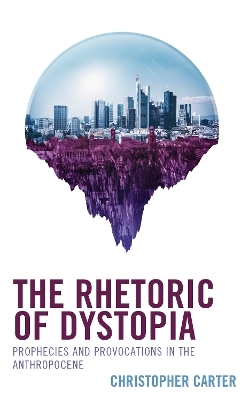
The Rhetoric of Dystopia
Prophecies and Provocations in the Anthropocene
Seiten
2024
Lexington Books/Fortress Academic (Verlag)
978-1-6669-4148-7 (ISBN)
Lexington Books/Fortress Academic (Verlag)
978-1-6669-4148-7 (ISBN)
The Rhetoric of Dystopia develops an idea of “emergent metalepsis” that describes the uncanny moments where fictive texts anticipate material events. Christopher Carter situates this rhetoric within debates about the Anthropocene, highlighting the irony whereby our most trenchant self-analyses become mass commodities.
The Rhetoric of Dystopia develops an idea of “emergent metalepsis” that describes the uncanny moments where fictive texts anticipate material events, blurring the boundary between the storyworld and the world of reception. Christopher Carter treats dystopia as rhetoric that shapes collective identities while speeding across platforms and geopolitical borders, at once critiquing and exemplifying the circulation of power relations through varied modes. This rhetoric features rampant viruses, authoritarian governments, corporate behemoths, corrupt educational and scientific institutions, and brutal policing, sometimes amplifying existing trends and sometimes merely documenting them. From Bong Joon-ho to Reed Morano, Octavia Butler to Richard McGuire, artists proffer arguments whose gravity we often fail to register, thus calling into question the uses of media literacy in an age of looming cataclysm. Carter situates this rhetoric within scholarship on literacy, built environments, border policies, global food production, and the Anthropocene.
The Rhetoric of Dystopia develops an idea of “emergent metalepsis” that describes the uncanny moments where fictive texts anticipate material events, blurring the boundary between the storyworld and the world of reception. Christopher Carter treats dystopia as rhetoric that shapes collective identities while speeding across platforms and geopolitical borders, at once critiquing and exemplifying the circulation of power relations through varied modes. This rhetoric features rampant viruses, authoritarian governments, corporate behemoths, corrupt educational and scientific institutions, and brutal policing, sometimes amplifying existing trends and sometimes merely documenting them. From Bong Joon-ho to Reed Morano, Octavia Butler to Richard McGuire, artists proffer arguments whose gravity we often fail to register, thus calling into question the uses of media literacy in an age of looming cataclysm. Carter situates this rhetoric within scholarship on literacy, built environments, border policies, global food production, and the Anthropocene.
Christopher Carter is professor of English at the University of Cincinnati.
Chapter One: Dystopian Literacies: Writing in Worlds Gone Wrong
Chapter Two: Roquentin’s Nightmare: Fantastic Spaces and Failed Individuation
Chapter Three: Limit Cases: Youth on the Border
Chapter Four: Eating Our Own Crimes: Food Horror in the Anthropocene
Chapter Five: Out of Time: Kairos and the Post-Apocalypse
| Erscheinungsdatum | 01.06.2024 |
|---|---|
| Sprache | englisch |
| Maße | 158 x 236 mm |
| Gewicht | 503 g |
| Themenwelt | Geisteswissenschaften ► Sprach- / Literaturwissenschaft ► Sprachwissenschaft |
| Sozialwissenschaften ► Kommunikation / Medien ► Kommunikationswissenschaft | |
| Sozialwissenschaften ► Kommunikation / Medien ► Medienwissenschaft | |
| ISBN-10 | 1-6669-4148-4 / 1666941484 |
| ISBN-13 | 978-1-6669-4148-7 / 9781666941487 |
| Zustand | Neuware |
| Informationen gemäß Produktsicherheitsverordnung (GPSR) | |
| Haben Sie eine Frage zum Produkt? |
Mehr entdecken
aus dem Bereich
aus dem Bereich
Das umfassende Standardwerk auf der Grundlage der aktuellen amtlichen …
Buch | Hardcover (2024)
Duden (Cornelsen Verlag)
CHF 48,95


